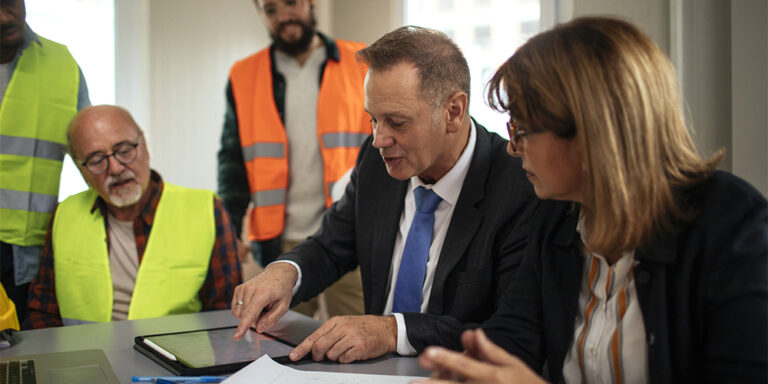— 7 min read
Construction Kickoff Meetings: How a Strong Start Leads to a Less Costly Finish
Last Updated Nov 12, 2024
Last Updated Nov 12, 2024

Starting a construction project can be daunting — and getting the entire team together in a room to discuss its details can be just as tough, often resulting in long, challenging meetings to meticulously review the specifications of the plan. But by following a few best practices, a kick-off meeting can be focused and efficient, setting the tone for efficiency across the rest of the project’s life cycle.
The kickoff meeting is defined as the initial gathering of all key stakeholders, including general contractors (GCs), subcontractors, architects and engineers, as well as clients and representatives. It’s a juncture of the minds of everyone who will lead the project to closeout and serves as a chance to align together on project details, expectations, timelines and protocols, as well as address preliminary concerns.
An expertly managed kickoff meeting should be a strategic opportunity to drive success from the jump. These meetings lay the groundwork for effective communication and collaboration, tackling common challenges like team member buy-in and role clarity.
This article explores the many important functions of kickoff meetings — from responsibility delegation to creating a single source of truth — and offers tips on how to transform kickoff meetings from mere formalities into powerful tools that fuel both efficiency and profitability.
Table of contents
Setting the Construction Kickoff Meeting Agenda
The first step to a focused kickoff meeting is to set a clear agenda.
While teams can choose between remote and in-person kickoff meetings, holding them in person can facilitate better communication. Since one of the biggest goals of the kickoff meeting is to establish the basis for relationships that will span the project, it can be useful to ask team members to engage directly face-to-face, if time allows.
A constructive kickoff meeting agenda should address fundamental points: who is responsible for what, when and how. Clearly defining everyone's roles and responsibilities at the outset helps to prevent any confusion about task ownership later on.
This meeting is about creating a common understanding among all team members from day one. We’ll have a quick review of plans and specs, discussion of any pre-construction RFIs from the initial review of the drawings.
And then, verifying processes is a really big thing. Who's in charge of what? You have to know, so you don't get in the thick of the project and not understand who's responsible for reviewing RFIs or submittals for observations, for example.
Nate Belcher
Assistant Project Manager
Hubbell Realty
It’s also important to review logistical and contractual details. Make sure that everyone understands the project timeline, the budget and any specific contracts or agreements.
Standardization and Flexibility
Every kickoff meeting is different and crafted for the individual project. However, the cycle of discussion topics can be repetitive, involving outlining the project scope and reviewing the project timeline and budget.
It can be helpful to develop a standardized template for the meeting’s agenda, including subsections for scopes of work, plan review, submittals and materials, permits and inspections, equipment, scheduling and budget.
Since projects differ in complexity and specific challenges, a one-size-fits-all approach may not be perfectly effective. Two useful approaches to the agenda are to include time for review and revision from team members before the meeting, and then also to make space for feedback during the actual meeting.
It can also be useful to review the kickoff meeting agenda at the end of a project—requesting insights in retrospect on what may have been useful to know from the start, so that it can be included in future jobs.
When we first started doing kickoff meetings, we didn’t go as in-depth as we do now. These meetings can seem kind of long-winded, but they’re really important to make sure you start your project off on the right foot in a streamlined way. And a big takeaway from us doing these for so long, is that as things change, we have continually found better ways of doing things. I think of the agenda as a living document—it’s a starting point to make sure we have a full detailed conversation. And we update it when we need to.
Nate Belcher
Assistant Project Manager
Hubbell Realty
Documenting for Clarity and Reference
One of the main purposes of a kickoff meeting is to create a detailed record that the team can refer back to throughout the project. This documentation serves as a reliable source of truth, capturing important decisions and responsibilities agreed upon during the meeting—and by doing so, the project team can prevent misunderstandings and even rework later on.
Having thorough documentation means that if someone forgets their responsibilities or if there's any disagreement about what was decided, the team can easily check the notes as a reference.
Establishing Roles and Responsibilities
Kickoff meetings are the perfect time to clearly define who is responsible for each task in a construction project. This means identifying key roles, like the project manager and the superintendent, and making sure everyone knows what they need to do. When roles are clear from the start, the team can avoid confusion and easily manage responsibilities as the project moves forward.
When everyone knows their duties, there's less chance for rework and fewer communication gaps, which helps the project run smoothly. When team members know exactly who to contact for specific issues, their decision-making and problem-solving can happen faster. In short, clarifying everyone’s individual part in a project's success creates a more cohesive and efficient team.
Setting Project Goals and Milestones
Pro Tip
Setting project goals gives everyone a chance for buy-in. It’s also helpful because sometimes the field and office staff look at things differently — and either might catch a value engineering opportunity if the budget’s tight.
One of the biggest priorities of a kickoff meeting is to provide a clear roadmap for the project that leads team members to success. Setting goals and milestones is one way for the project leadership to track its progress over time.
Goals will vary project to project, but in general, they should be clear, specific and easy to understand. When discussing objectives, focus first on the main priorities. Then, break down these big goals into smaller, achievable milestones, which can serve as checkpoints along the way.
Finally, make sure everyone understands their role in reaching these goals and milestones. This will help keep everyone accountable and motivated throughout the project.
Overcoming Challenges in Kickoff Meetings
The biggest antagonist to a kickoff meeting is a short attention span among team members. To get past initial resistance to this often lengthy meeting, clearly explain the benefits and goals at the beginning and remind everyone that they’re on the same team.
Keeping the meeting focused and concise can help people stay engaged, but it’s a complicated balancing act to also make sure that all logistical and contract details are covered, especially in larger projects. Setting a clear agenda—and soliciting feedback beforehand—can help make sure nothing is missed.
Incorporating structured breaks or brief check-ins during the meeting can also help maintain focus. Using charts or other visual aids can make complicated information easier to understand, helping to share important details without slowing down the meeting.
Another way to manage the effectiveness of the meeting is to plan the follow-up by properly recording what was discussed and sending notes and minutes afterward. When team members can access the meeting notes and can look back at them later, they can prevent confusion, review the notes and clarify their roles. It can be helpful to make use of a central digital platform to share and store these documents to keep everyone on the same page.
Well-Executed Kickoff Meetings: Maximizing Communication
When all team members are aligned on project goals and responsibilities, companies reduce the likelihood of costly errors and rework. And by clearly delineating roles, team members should know what part of the project they own — and can efficiently look back on the minutes, if there’s any confusion — which can help minimize delays and aid problem-solving.
Overall, the efficiency and clarity achieved through a successful kickoff meeting can enhance productivity, improve client satisfaction and boost a company's profitability.
Was this article helpful?
Thank you for your submission.
100%
0%
You voted that this article was . Was this a mistake? If so, change your vote here.
Scroll less, learn more about construction.
Subscribe to The Blueprint, Procore’s construction newsletter, to get content from industry experts delivered straight to your inbox.
By clicking this button, you agree to our Privacy Notice and Terms of Service.
Categories:
Tags:
Written by
Nate Belcher
Nate Belcher brings almost a decade of industry experience to his current role as an Assistant Project Manager at Hubbell Realty Company. Before his current position, Nate served as an assistant superintendent, project engineer and an assistant commercial superintendent intern at Hubbell. Nate's career began with roles such as project manager intern at Russell Co. and Gas Engineering Intern at Mid American Energy Company, where he gained both technical and collaborative skills. He also has hands-on experience in residential construction from his time with Orville Belcher Construction and Remodeling. Nate holds a bachelor's degree in construction engineering from Iowa State University, and is based in West Des Moines.
View profileTrey Strange
26 articles
Trey Strange is a Peabody and Emmy-Award winning writer and producer based in Brooklyn, NY. Throughout his career, Trey has worked for the Huffington Post, Houston Chronicle, Out Magazine, Brooklyn Eagle, CNBC, INTO, and New York Magazine's Bedford + Bowery. He received his Masters in Journalism and Middle East studies from New York University, and Bachelors in the same subjects from the University of Houston.
View profileExplore more helpful resources

Mission Critical Construction: Strategies for Success
Mission critical construction involves building structures whose functions cannot afford to fail, as any disruptions can lead to significant consequences for society. Keeping data centers, hospitals, power plants and other...

Modular Construction and MEP: A Collaborative Pairing
In an age of supply chain disruptions, workforce shortages, and rising material costs, off-site construction — including modular construction methods and prefabricated materials — is surfacing as a multipurpose solution....

Connected Construction: Transforming the Industry Through Integration
Construction projects are becoming increasingly complex, so companies need to innovate to accurately and profitably complete these modern structures. Connected construction — using technology and data to improve communication, processes...

Off-Site Construction: Prefab vs. Modular
As the construction world becomes ever more competitive, deadlines get tighter and the margin for error gets slimmer, project owners around the world are always looking for an edge. Thanks...